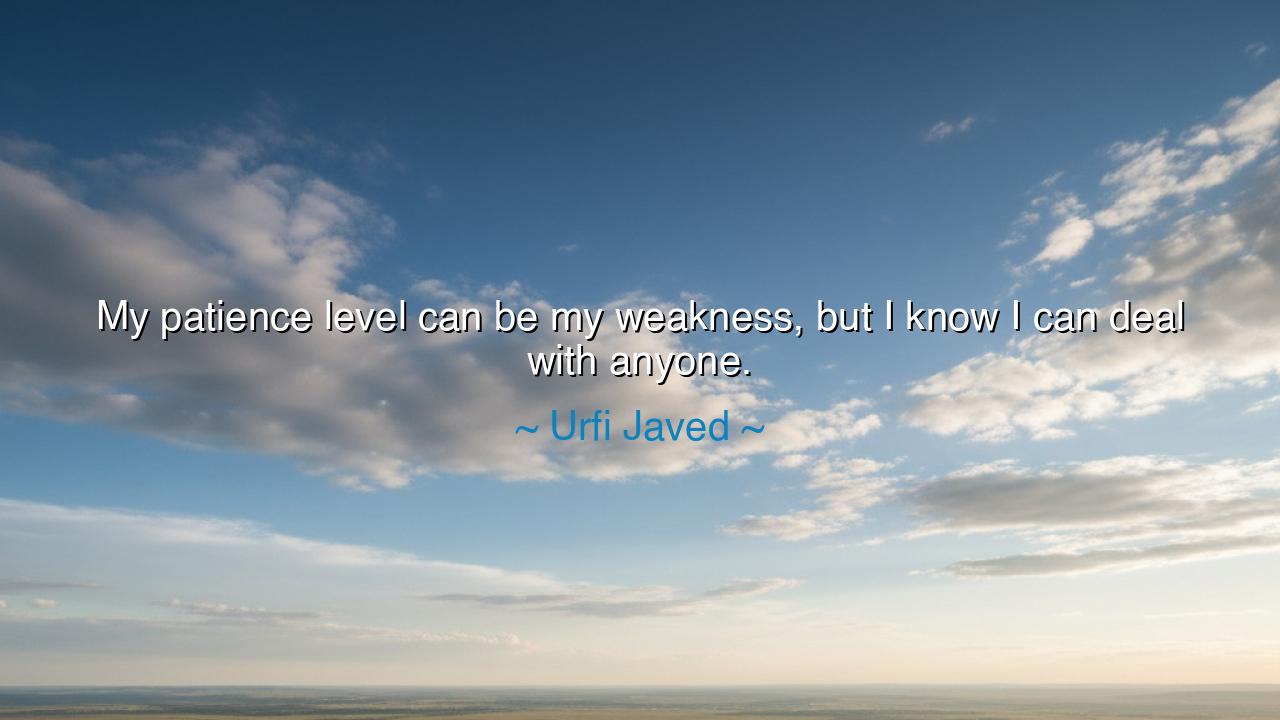
My patience level can be my weakness, but I know I can deal with






Hear the voice of Urfi Javed, bold spirit of the modern age, who declared with striking honesty: “My patience level can be my weakness, but I know I can deal with anyone.” These words, simple yet profound, reveal the duality of human character. For in every strength lies a shadow, and in every weakness lies a hidden weapon. To confess that one’s patience is limited is to admit humanity, yet to proclaim the ability to deal with anyone is to reveal resilience—the capacity to stand unshaken before opposition, conflict, or adversity.
The origin of this saying comes from Javed’s own life as a figure in the public eye, often scrutinized, criticized, and tested by a world quick to judge. In such a space, patience becomes not only a virtue but a shield. Yet her confession is that this shield sometimes slips, that her temper or restlessness may expose her. But still, she does not fall. For she possesses another strength, the courage to confront, the wit to answer, and the confidence to stand tall. Thus, her words carry a paradox: weakness in patience, but strength in resilience.
Consider how many throughout history have shared this dual nature. Think of Napoleon Bonaparte, whose impatience often drove him to rash campaigns, yet whose boldness and brilliance allowed him to outmaneuver kings and emperors. His lack of patience sometimes became his downfall, yet his sheer ability to deal with anyone on the battlefield made him one of the most formidable leaders in history. Like Javed’s confession, we see that weakness and strength often walk hand in hand, shaping destinies through their interplay.
Or look to the life of Winston Churchill. Known for his fiery temper and lack of patience, he could grow easily frustrated, and yet in the crucible of war, he showed an unbreakable capacity to face enemies both foreign and domestic. His impatience might have been a flaw, but his determination to deal with anyone—to meet threats with courage and defiance—became his legacy. Here again, we see that imperfection need not destroy greatness; rather, it may sharpen the edge of character.
The heart of Javed’s wisdom is this: to acknowledge one’s weakness is not to admit defeat. The world often teaches us to hide our flaws, but she teaches us to name them, to own them, and to balance them with other strengths. To say, “My patience is low” is not a surrender, but a declaration of self-knowledge. And to add, “but I can deal with anyone,” is to affirm that weakness does not define the whole person—resilience, courage, and adaptability can still carry the day.
The lesson for us is clear: do not fear your weaknesses, but learn to master them. Acknowledge where you lack patience, endurance, or calm—but also recognize what strengths arise to meet those gaps. Are you quick to anger? Perhaps that fire gives you the courage to speak when others remain silent. Are you restless? Perhaps that same restlessness drives you to action while others waste away in hesitation. Weakness, when balanced with awareness, can become a source of power.
So I say to you, children of tomorrow: embrace the truth of Urfi Javed’s words. Know your limits, but do not be ruled by them. Let your weaknesses teach you humility, and let your strengths give you confidence. Remember always that even if patience falters, the will to deal with anyone can sustain you. For life does not demand perfection—it demands resilience. And those who endure, even imperfectly, will find their way through storms with head held high.






AAdministratorAdministrator
Welcome, honored guests. Please leave a comment, we will respond soon